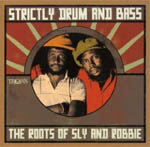SLY
AND ROBBIE (1952
- and 1953 - )
STRICTLY DRUM AND BASS - THE ROOTS OF SLY AND ROBBIE * * * /  1969 - 1979 - Trojan - studio
- discs: 1
1969 - 1979 - Trojan - studio
- discs: 1The "Strictly Drum And Bass - The Roots Of Sly And Robbie" compilation covers ten years inside Sly And Robbie's long and successful career. Even if they are not singers, they are filed separatley under a dedicated page. But before commenting the tracks collected here, let us see some details about the so called Riddim Twins. Lowell Charles Dunbar was born in Kingston in 1950. His first band was called the Yardbrooms, but his first serious approch to music came under Ansel Collins, who brought Dunbar to a studio in 1969 to play drums on a single called "Night Doctor". This track, which opens the compilation, was issued by Lee "Scratch" Perry and credited to the Upsetters. In 1970 Collins employed again Dunbar for a single called "Double Barrel" (featured here as all the other tracks mentioned), credited to Dave (Dave Barker) and Ansel Collins, and produced by Winston Riley. Around twenty years old, Dunbar played with Rht Invincibles (leaded by Collins) and Tommy McCook's Supersonics. In the same period he played in Justin Hinds And The Dominoes' "Say Me Say" (a track based on the "Jezebel" rhythm and produced by Duke Reid). Around 1971-1972 Dunbar was part of a band called The Volcanoes, a house band of a hotel of the north coast. As a fan of the American band Sly And The Family Stone, Dunbar was from now on called Sly. The other side of the Riddim Twins is of course Robbie Shakespeare. Born in Kingston in 1953, he was introduced to the bass by Aston "Family Man" Barrett, member at the time of the Hippy Boys. As Barrett left the group Robbie joyned in. His first session was for Errol Dunkley's "You Never Know", cut in 1974, based on the Beatles "I'll Be Back" and produced by Sonia Pottinger. Around this time Robbie was playing with Big Relation, a band that featured Cornell Campbell on vocals. As Cornell became involved in the Eternals, both became associates of the emerging producer Bunnt Lee. Robbie had already played in Slim Smith's "Blinded By Love" in 1971 and when the Wailers cut the seminal "Catch A Fire" set, he played on two tracks: "Concrete Jungle" and "Stir It Up". In the meantime Sly founded the group Skin Flesh & Bone. So in 1973 along with Al Brown they cut "Here I Am Baby", produced by Dickie Wong and Geoffrey Chung. The following year appeared the instrumental version of that same track, retitled "Tit For Tat" (same producers as before). Thier collaboration with Al brought to "I've Got To Go On Without You", a single recorded in 1974 and again produced by Wong and Chung. In 1975 Ranchie Mclean's "I'm Falling In Love" was released. In that same year "Prince" Tony Robinson produced the strong "The Message" by Barrington Spence, based on Ken Boothe's "Moving Away". Around the same time Skin Flesh & Bone become The Revolutionaries, the house band at Channel One. In the meantime Robbie was the member of The Aggrovators, Bunny Lee's band. In 1975 they backed Cornell Campbell's hits "Wherever I Lay My Hat" and "I Shall Not Remove". They also backed Johnny Clarke's "Rock With Me Baby" (1974) and "Move Out Of Babylon" (1975). In 1975 The Aggrovators also backed to hits by Linval Thompson: "Natty Dread Girl" and "Don't Cut Off Your Dreadlocks". In that same year the band also backed John Holt's "You'll Never Find Another Love Like Mine". During this period Robbie sometimes joyned The Revolutionaries and Sly joyned The Aggrovators: a production partnership was in the air. In 1975 another hit from Holt was released: "Up Park Camp", produced by Jo Jo Hookim. In 1979 came Trinity' deep "Pope Paul Dead And Gone", followed by The Revolutionaries version called "Freedom Dub". Both tracks were produced by Linval Thompson. Around this time Robbie and Sly Taxi label (taking its first steps around 1975) would emerge stronger then ever. This compilation closes with Ken Boothe's "You're No Good" from 1978. The contribution of the Riddim Twins during more than thirty years of Jamaican music is enormous. The material presented here even if it covers ten years through just twentyone tracks, and not all is that impressive, is enough to demonstrate how strong their contribution was. A compilation dedicated to two musicians so great at least should be made of five discs. Since this will hardly happen, enjoy the better material here and keep attention while you are listening to some songs around. Maybe that strong pattern from the drums and that hard bass line comes exactly from them. |